- Home
- /
- Managing Substance Misuse
The Council recognises the need to manage the effects of substance misuse problems in the workplace and will make every effort to ensure that such problems do not adversely affect service delivery and/or the health, safety and welfare of employees and/or the public. Employees must ensure that, whilst at work, they are free of the effects of substances. It is recognised that substance misuse problems may arise which have an effect on an employee’s behaviour and/or ability to perform their duties. The Council will make every reasonable effort to help and support employees in such circumstances with encouragement given to seek appropriate treatment that will allow them to return to an acceptable standard of performance and/or behaviour.
Likewise, the Council is committed to assisting managers to recognise and effectively deal with substance misuse problems in the workplace. An employee who refuses advice or assistance or discontinues an identified treatment/support programme before its conclusion will normally be subject to the appropriate Council procedure for managing conduct, attendance or work performance where their conduct, attendance or work performance continues to be unacceptable.
This information will help you if:
- You are an employee looking for guidance on sensible drinking
- You are an employee who is looking for support for a substance misuse
- You are an employee who is going through the Managing Substance Misuse process
- You are a manager and an employee has informed you that they may have a substance misuse problem
- You are a manager who is dealing with an incident suspected to have been caused by substance misuse
1. Managing Substance Misuse Definition and Scope
Substance misuse is defined for the purposes of this policy as the intermittent or continual use of substances, legal or otherwise, which causes detriment to the employee’s health, social functioning or work performance, and which affects efficiency, productivity, safety, attendance, timekeeping or conduct in the workplace.
For the purpose of this policy, the term ‘substance’ includes:
- Any illegal substances (as defined in the Misuse of Drugs Act 1971 or the Psychoactive Substances Act 2016);
- Alcohol;
- Prescribed medication;
- Over the counter medication;
- Solvents, i.e. lighter gas refills, aerosols, glues, paint thinners, etc.
- Any plants, chemicals or other substances that have not been defined as illegal, and which are used for the purpose of seeking intoxication.
Prescribed Medication
Regardless of whether an employee has a substance misuse problem, where drugs are prescribed by a qualified medical practitioner, employees are expected to seek advice from the medical practitioner or pharmacist as to whether these drugs might affect their ability to fully undertake their work duties. If this is the case the employee must notify their manager immediately that they are taking medicine which may cause side effects that impairs their ability to undertake their duties safely and effectively. The manager will not ask the employee what the actual medication is, it is only the effect of the medication that requires to be known about.
Where an employee informs management of any medication prescribed that may affect their ability to carry out their work duties, managers should ensure that measures are put in place so that the employee can continue to work in a safe and effective manner.
Where an incident occurs due to the effects of prescribed medication and the employee has failed to notify their manager of the use of this medication, the employee may be subject to the Discipline policy and procedure.
This policy is concerned with the effects of substance misuse in the workplace and applies to all employees. Others undertaking work for or on behalf of the Council, but not employed by the Council, e.g. agency/casual/relief workers and contractors are required to adhere to the policy guidelines even though not covered by procedural details.
2. Core Principles
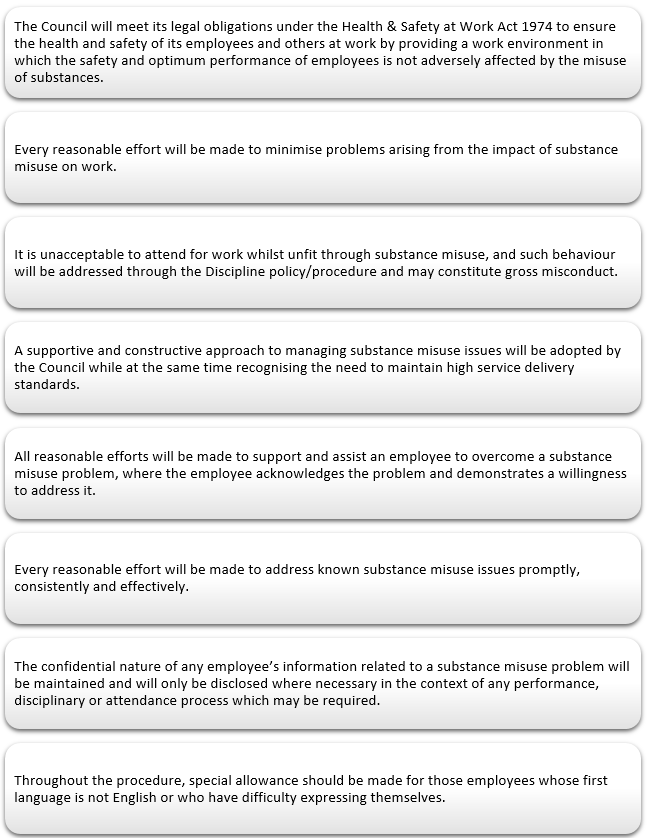
Other Considerations
- It is unacceptable for employees to consume alcohol or illegal substances during working time.
- If an employee is identified as being in possession of an illegal substance in the workplace they will be subject to the Discipline policy/procedure and may be reported to the Police. Any person suspected of supplying illegal substances in the workplace will be reported to the Police and will be subject to the Discipline policy/procedure.
The confidential nature of any records of employees who have a substance misuse problem will be preserved.
Throughout the procedure, special allowance should be made for those employees whose first language is not English or who have difficulty expressing themselves.
3. Organisational Responsibilities
As a responsible employer, the Council is aware of its responsibility for the health, safety and welfare of employees and recognises that their wellbeing is important to performance. In view of this it is important that the responsibilities for the management of substance misuse within the workplace are explicit and clearly defined. For further information on responsibilities please select the relevant button below.
Managers' Responsibilities Employees' Responsibilities
4. Managing Substance Misuse Procedure and Referrals
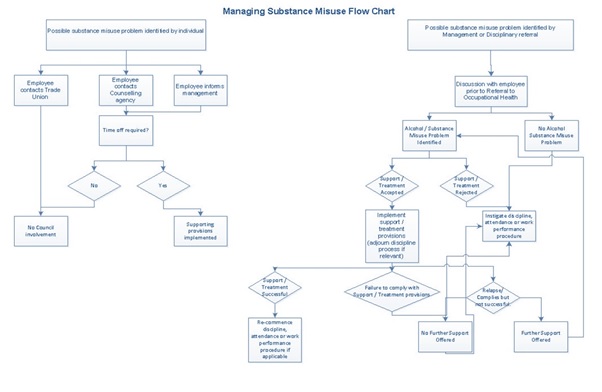
A substance misuse problem can come to light in various ways, either by line manager identification or as a result of a formal disciplinary, capability or attendance process, or through the employee raising the matter themselves.
Please see the How to Recognise Substance Misuse page for guidance.
5. Managing Substance Misuse Referrals
A substance misuse problem can come to light in various ways, either by line manager identification, as a result of a formal disciplinary, capability or attendance process, or through the employee raising the matter themselves. A substance misuse problem will be addressed as either a ‘management referral’, a ‘disciplinary referral’ or as a ‘voluntary referral’, depending on how it is identified, with full details of the referral processes and how matters are dealt with contained in the accompanying guidance notes.
Managers' Guidance on Referral Routes
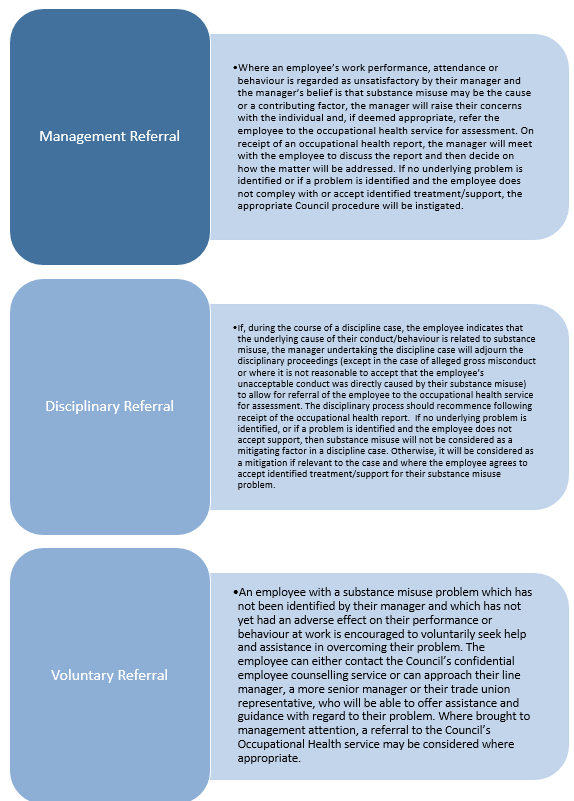
6. Supporting Provision
Management or Disciplinary Referral
If a problem is identified through the management or disciplinary route the employee will be offered the following support and will be required to sign an agreement outlining the commitment expected of them and the consequences of failing to adhere to the treatment or support programme – please see the button below for treatment agreements for both non-disciplinary and disciplinary cases.
Voluntary Referral
If a problem is voluntarily identified by the employee to their line management out with any performance, disciplinary or attendance process they may be offered the following support:
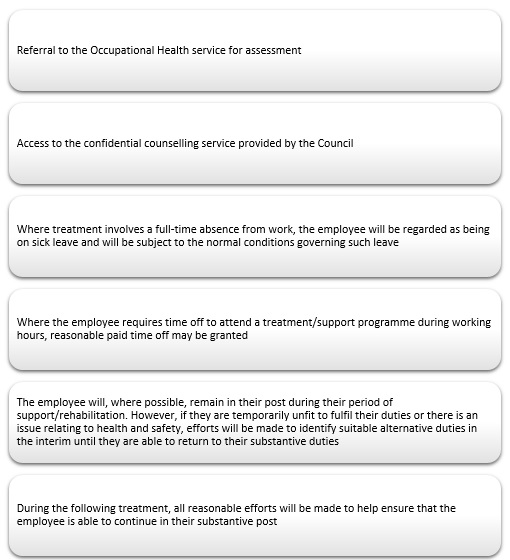
Relapse
Individuals who have problems with substance misuse may relapse. Where this occurs, in the first instance, consideration should be given to a further referral to Occupational Health for assessment and advice, with the intention to then continue with support under this policy. However, where there is a further instance(s) of relapse, employees should be managed under the relevant policy or through the capability process, if and where appropriate.
With relapse most likely to occur in the initial months of a period of rehabilitation, where an employee has been relapse free for a period of 12 months or more from their initial assessment by Occupational Health, the substance misuse issue should be regarded as resolved. If after this 12-month period an employee relapses into substance misuse, for the purposes of their employment this should be regarded as an entirely new episode with the same supporting provisions applying as an entirely new referral.
It should be noted that in very exceptional circumstances such as a family bereavement, consideration can be given by a manager on a case by case basis to disregard an instance of relapse before deciding whether to continue to to consider the employee under the Substance Misuse policy/procedure or progress matters under the relevant Council policy (attendance, performance, discipline).
7. Disciplinary Actions
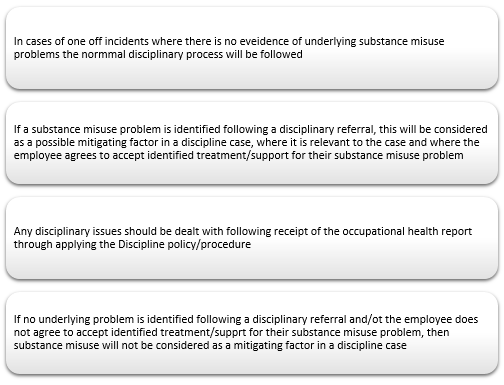
In cases of alleged gross misconduct, the disciplinary process will continue regardless of whether the employee’s apparent actions may be attributed to substance misuse. Also, the disciplinary process will continue as normal if it is not reasonable to accept that the employee’s conduct was directly caused by their substance misuse. In each of these situations the employee’s misuse problem needs to be dealt with as a separate matter with the offer of assistance and support still made.
If the employee’s performance continues to cause concern or if the employee fails to achieve acceptable levels of attendance following the conclusions of a support programme the Managing Performance or Maximising Attendance Procedure will be instigated.
Managers' Guidance on Dismissal Procedures
8. Capability
Where the employee is unable to return to their substantive post and a suitable alternative post is not available, a Capability Hearing will be arranged.
Management guidance notes detail the process that should be followed at the hearing.
The employee has the right of appeal against a dismissal decision within 10 days of receipt of written notification.
9. Testing
The Council may test an employee for substance misuse in the following circumstances:
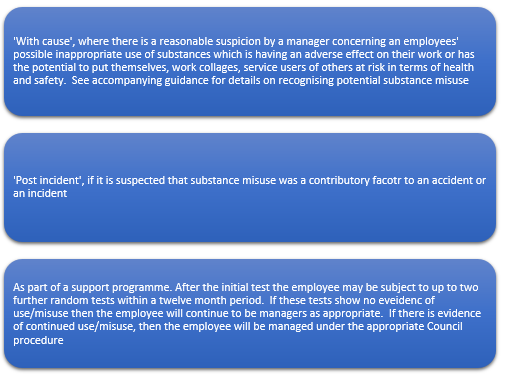
Drugs tested are as follows;
- Alcohol
- Amphetamines (including Ecstasy)
- Barbiturates
- Benzodiazepines
- Buprenorphine
- Cannabis
- Cocaine
- LSD
- Opiates
- Methadone
- Methaqualone
- Phencyclidine
- Propoxyphene
The sample is also checked for creatinine levels which indicates if a sample is too dilute to give an accurate result.
Testing will be carried out only by the Council’s occupational health provider. Employees are required to co-operate if they are requested to undergo a test.
10. Additional Information for Managers
MEETING TECHNIQUE
Below is a list of guidelines for use when meeting employees with a suspected problem:
DO
- ensure, at formal meetings that the employee’s right to be accompanied is respected;
- keep the focus of the meeting strictly on the issue of work performance, conduct and/or attendance;
- present the employee with documented facts of the poor work performance, conduct and/or attendance, if appropriate;
- ensure, where a problem has been identified, that the employee is made aware of the policy and the referral procedures;
- resist appeals from the employee to ignore procedures.
DON’T
- make accusations of problem drinking, being an alcoholic or drug user;
- make references to personal habits;
- seek to force the employee to accept referral for counselling or treatment;
- jump to conclusions;
- try to become an addiction counsellor;
- moralise;
- become involved in verbal battles to “prove” right or wrong, fairness or unfairness;
- lose your temper.
If an employee comes to you to report their concerns regarding another employee then this should be looked into whilst retaining the confidentiality of those involved.
EDUCATION AND INFORMATION
The Council will provide information and guidance to managers and employees on the effects of substances as defined within the Managing Substance Misuse Policy and Procedure. Examples include:
- Information on sensible drinking
Further guidance on sensible drinking is available here.
- Recognising substance misuse
Further guidance for managers on how to recognise substance misuse is available here.
- Campaigns and events organised through the Employee Good Health Group. (Accessed via Internal Network only) Information can be found on the Zone and notice boards.
Sources of further advice and information
There are a number of support services available to which employees may be referred. Among them are:
Occupational Health Service
OH Assist
Tel: 0845 850 9098
Email: AberdeenCity@ohassist.com
Employee Counselling Service
Time for Talking
Free phone 0800 97003980 (24 hours a day; 365 days a year)
Email: admin@timefortalking.co.uk
Further information
Advice and information can also be obtained from the following sources:
- Alcohol Concern – alcoholconcern.org.uk
- NHS Scotland –http://www.healthscotland.com/topics/health/alcohol/index.aspx
- The Scottish Drugs Forum – sdf.org.uk
- Drinkaware – https://www.drinkaware.co.uk/
- healthyworkinglives.com
- Alcohol Focus Scotland – alcohol-focus-scotland.org.uk
LEGAL IMPLICATIONS
It is an offence under the Misuse of Drugs Act 1971 for an employer to knowingly allow its premises to be used for the production or supply of controlled drugs and any person suspected of doing so will be reported to the Police and will be subject to the Managing Discipline procedure, this normally being construed as gross misconduct.
Where there is an allegation of other criminal conduct such as violence or drink driving, police involvement should be considered. This will be dealt with on a case by case basis giving consideration to the seriousness of the offence, whether it was committed outside of normal working hours and whether a third party has been hurt as a result.
You Might Also be Interested In
- Managing Substance Misuse Policy and Procedure
- Managing Substance Misuse Guidance for Managers
- Guidance on Sensible Drinking
- Sources of Further Advice and Information
- Managing Discipline pages
- Managing Discipline Policy and Procedure
- Managing Discipline Guidance for Managers
- Employee Code of Conduct
- Maximising Attendance
- Investigating Complaints by Service Users against Employees Guidance
- Maximising Attendance
Click here to return to the main People Management page
Add a ‘Like’ and/or a ‘Rating’ below to indicate how useful you found this page
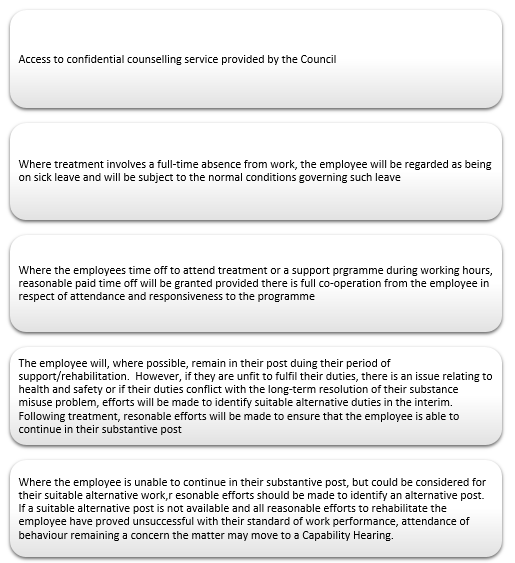
You must be logged in to post a comment.